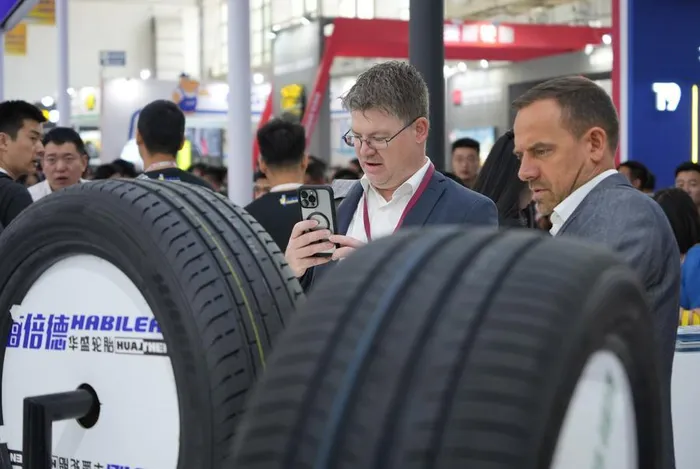
Foreign visitors take photos of rubber tires at the 15th China (Guangrao) International Rubber Tire & Auto Accessory Exhibition in Dongying City, east China's Shandong Province.
Image: Xinhua
Egypt’s manufacturing landscape is entering a transformative phase, with Chinese investors at the forefront. The announcement by China’s Sailun Group to establish a $1 billion tyre plant in the Suez Canal Economic Zone (SCEZ) is indicative of this shift. Beyond its headline value, the project highlights how Egypt is leveraging strategic foreign investment to expand industrial capacity, create jobs, and move up global value chains.
Sailun Plant: A Manufacturing Powerhouse in the Making
The Sailun tyre factory will cover 350,000 square meters, producing over 10 million tyres annually across three phases over three years. The first phase, scheduled for completion next year, is expected to generate roughly 1,500 jobs. Tyre manufacturing is a technically demanding sector, requiring integration of raw materials (steel, synthetic and natural rubber, chemicals), precision machinery, quality control, and logistics.
The facility will not only satisfy growing domestic demand but also supply regional markets in North Africa and the Middle East. Its sheer scale makes it one of the largest Chinese industrial investments in Egypt to date, signaling confidence in the country’s long-term industrial environment.
Industrialisation as a National Strategy
Egypt has made manufacturing central to its economic development plan. The National Industrial Development Strategy 2027 aims to increase the sector’s contribution to GDP from 16% to 20%, while raising industrial growth rates to 8% annually. The strategy emphasizes not just factory output but also local value addition, technology transfer, and workforce upskilling.
The Sailun plant, along with other recent projects, aligns directly with this strategy. By producing tyres domestically, Egypt reduces reliance on imports, builds supplier networks, and encourages knowledge and skill transfer across the industrial ecosystem.
Chinese Manufacturing Footprint in Egypt
China has become a major player in Egypt’s industrialisation push. As of 2023, Chinese FDI in Egypt totaled around $1.3 billion, with over 2,500 Chinese companies operating in sectors including electronics (OPPO), telecoms (ZTE), automotive (GAC Motor), solar energy (Kibing Group), and chemicals (phosphoric acid plants).
Many of these investments are concentrated in industrial and trade zones, particularly in the SCEZ, which offers strategic advantages like proximity to the Suez Canal, port infrastructure, free zone incentives, and logistics connectivity to Europe, Asia, and Africa. These zones facilitate export-oriented manufacturing, allowing foreign firms to integrate regional supply chains efficiently.
Building Value Chains Through Manufacturing
The manufacturing focus of investments like Sailun’s tyre plant extends beyond production to the creation of integrated industrial ecosystems. Tyre production requires raw material sourcing, chemical processing, steel fabrication, rubber compounding, and specialised logistics, all of which generate upstream and downstream opportunities for local suppliers.
This represents a significant shift for Egypt, which has historically been reliant on raw material exports and low-complexity manufacturing. By embedding advanced manufacturing processes domestically, Egypt is positioning itself to capture greater value from its industrial activity and improve workforce capabilities in technical and managerial roles.
Employment and Skills Development
While the Sailun facility will generate 1,500 direct jobs in its first phase, its broader employment impact is likely higher. Supporting industries, materials suppliers, logistics operators, maintenance services, and quality assurance – stand to benefit from job creation. Technical training and workforce upskilling are inherent to tyre manufacturing, equipping workers with transferable skills applicable to other industrial sectors.
Opportunities in Regional Supply and Exports
The SCEZ’s location allows Egypt to serve both domestic and regional markets efficiently. With tyres in high demand across North Africa and the Middle East, the Sailun plant will help Egypt become a hub for export-ready manufacturing. Integration into regional value chains also attracts ancillary investments in logistics, warehousing, and transportation infrastructure, further strengthening Egypt’s manufacturing ecosystem.
Other Chinese projects complement this strategy: in 2023–2024, Kibing Group announced a $685 million solar panel plant, and a phosphoric acid factory was approved at roughly $658 million. These investments signal a focus on energy-intensive and chemical manufacturing, sectors that often underpin advanced industrial capacity.
Risks and Industrial Considerations
Rapid manufacturing expansion carries challenges. Over-reliance on foreign technology and inputs may limit local value capture unless policies promote domestic content and joint ventures. Environmental management, safety standards, and industrial regulation must keep pace with growth to ensure sustainable operations. Additionally, fluctuations in global commodity prices, energy costs, and foreign exchange rates could impact manufacturing profitability.
Nevertheless, with careful planning, such investments can catalyze the development of industrial clusters, technology diffusion, and long-term competitiveness.
Egypt’s Manufacturing Horizon
Egypt’s emerging industrial profile illustrates a deliberate pivot toward high-volume, export-oriented, and technologically sophisticated manufacturing. Chinese investment is a key driver, but the government’s strategic zoning, incentives, and industrial policies amplify these effects.
Sailun’s tyre plant is a case study in how targeted industrial FDI can reshape domestic manufacturing capacity, create jobs, and integrate local economies into regional and global value chains. If Egypt continues to attract large-scale industrial projects while fostering local supplier networks and workforce skills, it could solidify its position as a North African manufacturing hub.
Manufacturing is becoming the backbone of Egypt’s economic transformation. Investments like Sailun’s tyre plant demonstrate how industrial capacity, workforce development, and regional integration converge to create sustainable growth. Beyond the factory gates, these projects signal Egypt’s ambition: to move from resource-dependent economic structures to a diversified, export-oriented, and resilient industrial base.
In a continent where manufacturing has often lagged, Egypt’s experience shows the potential of combining strategic foreign investment with industrial policy, infrastructure development, and workforce planning to create a competitive, future-ready manufacturing ecosystem.
Written By:
*Chloe Maluleke
Associate at BRICS+ Consulting Group
Russian & Middle Eastern Specialist
** MORE ARTICLES ON OUR WEBSITE https://bricscg.com/
** Follow https://x.com/brics_daily on X/Twitter for daily BRICS+ updates
Related Topics: